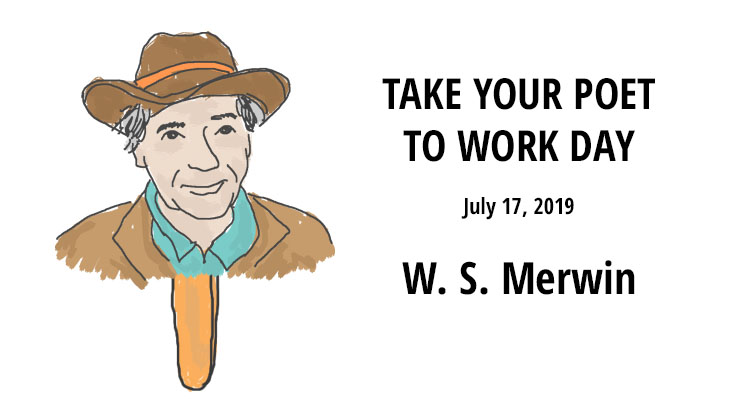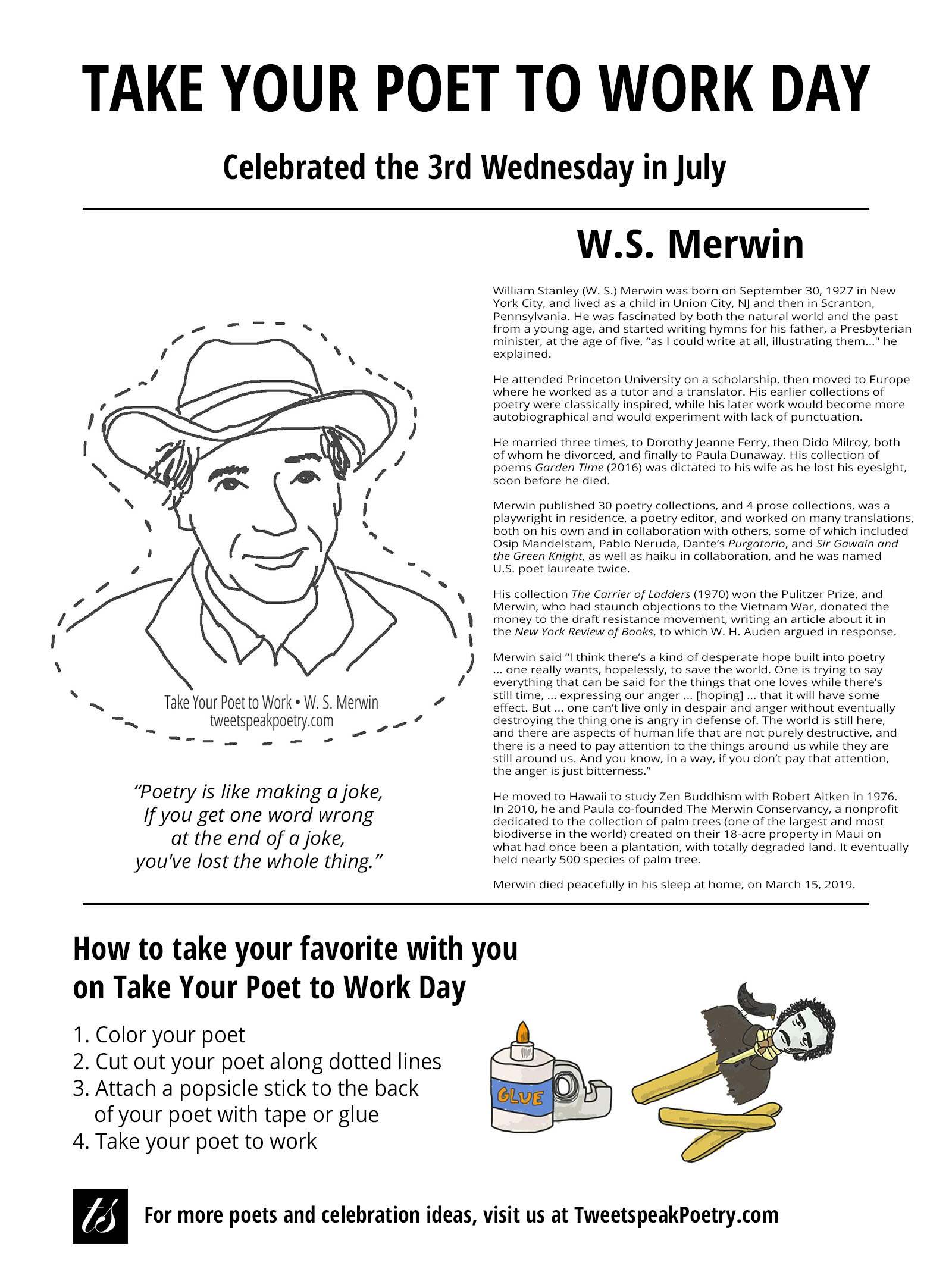Summer is one of the happiest seasons at Tweetspeak Poetry, because it is the season of Take Your Poet to Work Day (or, you know, to the beach). It’s one thing to start every day with a poem (we recommend it). But how great would it be to start your day with a poet? On Take Your Poet to Work Day, we encourage people around the world to take their favorite poet to work for the day.
Take Your Poet to Work Day is coming July 17, 2019
To help you play and celebrate with us, we’re releasing poets each week in a compact, convenient format you can tuck in your pocket, tool belt, or lunchbox.
We started our celebration five years ago with Sara Teasdale, Pablo Neruda, T. S. Eliot, Rumi, Edgar Allan Poe, and the reclusive Emily Dickinson (for folks who work at home).
We even released a full collection, The Haiku Masters: Matsuo Basho, Yosa Buson, and Kobayashi Issa.
In 2014, we added Langston Hughes, Adrienne Rich, John Keats, William Butler Yeats, Christina Rossetti and the beloved 20th-century American poet, Sylvia Plath.
In 2015, we introduced the Bard of Avon William Shakespeare, beloved poet Maya Angelou, and iconic American poet Robert Frost, Russian poet Anna Akhmatova, Polish poet Wisława Szymborska, and America’s poet, Walt Whitman.
In 2016, English Romantic poet William Wordsworth, joined in, along with Elizabeth Barrett Browning, Irish poet Seamus Heaney, and English poet and novelist Emily Brontë, Australian poet and activist Judith Wright, and Henry Wadsworth Longfellow.
Because you can never have too many poets in your lunch box (or your desk drawer), we also do a school-year celebration in April—Take Your Poet to School Week—with some favorites for the younger (and younger-at-heart) poetry readers: Shel Silverstein, Ogden Nash, Robert Louis Stevenson and the always delightful Mother Goose.
Last year, in 2018, we introduced Jorge Luis Borges, Rosalía de Castro, Sor Juana Inés de la Cruz, and Rosario Castellanos.
This year, we feature some of our recently lost American national treasures, like C.D. Wright, Tony Hoagland, Mary Oliver, and today’s new release, W. S. Merwin.
Take Your Poet to Work: W. S. Merwin
William Stanley (W. S.) Merwin was born on September 30, 1927 in New York City, and lived as a child in Union City, NJ and then in Scranton, Pennsylvania. He was fascinated by both the natural world and the past from a young age, and started writing hymns for his father, a Presbyterian minister, at the age of five, “as I could write at all, illustrating them…” he explained.
He attended Princeton University on a scholarship, then moved to Europe where he worked as a tutor and a translator. His earlier collections of poetry were classically inspired, described by Vernon Young in the American Poetry Review, as tied to “Biblical tales, Classical myth, love songs from the Age of Chivalry, Renaissance retellings; … carols, roundels, odes, ballads, sestinas, … they contrive golden equivalents of emblematic models: the masque, the Zodiac, the Dance of Death,” while his later work would become more autobiographical and would experiment with lack of punctuation.
He married three times, to Dorothy Jeanne Ferry, then Dido Milroy, both of whom he divorced, and finally to Paula Dunaway. His collection of poems Garden Time (2016) was dictated to his wife as he lost his eyesight, soon before he died.
Merwin published 30 poetry collections, and 4 prose collections, was a playwright in residence, a poetry editor, and worked on many translations, both on his own and in collaboration with others, some of which included Osip Mandelstam, Pablo Neruda, Dante’s Purgatorio, and Sir Gawain and the Green Knight, as well as haiku in collaboration, and he was named U.S. poet laureate twice.
His collection The Carrier of Ladders (1970) won the Pulitzer Prize, and Merwin, who had staunch objections to the Vietnam War, donated the money to the draft resistance movement, writing an article about it in the New York Review of Books, to which W. H. Auden argued in response.
Merwin said “I think there’s a kind of desperate hope built into poetry … one really wants, hopelessly, to save the world. One is trying to say everything that can be said for the things that one loves while there’s still time, … expressing our anger … [hoping] … that it will have some effect. But … one can’t live only in despair and anger without eventually destroying the thing one is angry in defense of. The world is still here, and there are aspects of human life that are not purely destructive, and there is a need to pay attention to the things around us while they are still around us. And you know, in a way, if you don’t pay that attention, the anger is just bitterness.”
He moved to Hawaii to study Zen Buddhism with Robert Aitken in 1976. In 2010, he and Paula co-founded The Merwin Conservancy, a nonprofit dedicated to the collection of palm trees (one of the largest and most biodiverse in the world) created on their 18-acre property in Maui on what had once been a plantation, with totally degraded land when they acquired it. It eventually held nearly 500 species of palm tree. The Conservancy mapped and cataloged the collection, which in 2014 received permanent protection from the Hawaiian Islands Land Trust.
Merwin died peacefully in his sleep at home, on March 15, 2019.
“Poetry is like making a joke,” Merwin said. “If you get one word wrong at the end of a joke, you’ve lost the whole thing.”
No Twilight
How suddenly now it seems that the day
is over and on the island where I
have lived these late happy years of my life
that Paula and I have been together
there is no twilight when the day is done
the day’s shadow is gone in the moment
it was here with all that went before
gone the same way into the one night
where time means nothing that is visible
when I look up after the light has gone
hearing a seed fall somewhere in the dark
—W. S. Merwin
Get your own W.S. Merwin – Take Your Poet to Work Printable that you can print, color, and cut out for the big day.
Illustrations by Will Willingham.
- Earth Song Poem Featured on The Slowdown!—Birds in Home Depot - February 7, 2023
- The Rapping in the Attic—Happy Holidays Fun Video! - December 21, 2022
- Video: Earth Song: A Nature Poems Experience—Enchanting! - December 6, 2022


Bethany says
Thank you for sharing this. I was touched by the featured poem and would like to read more of Merwin’s work.